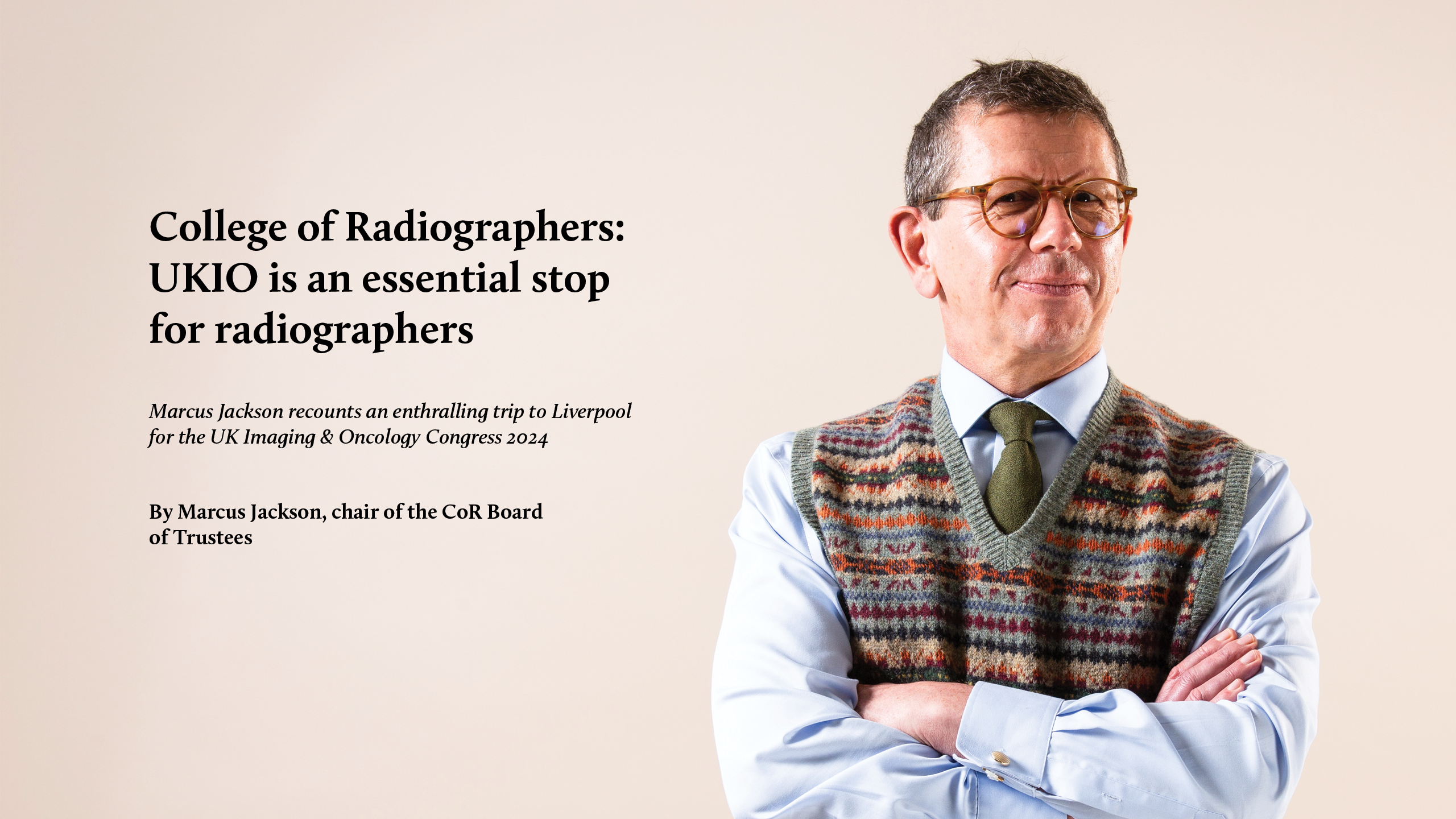
As chair of the College Board of Trustees, I had the privilege of attending the UK Imaging & Oncology (UKIO) Congress on 10-12 June.
UKIO continues to be the leading event for cutting-edge, practice-based content designed for a multidisciplinary audience. It provides an excellent opportunity to network with fellow professionals and explore the latest advances in imaging and oncology technologies showcased in the technical exhibition.
The theme for the 2024 event, ‘Putting people first’, perfectly aligns with one of the fundamental goals of both the College and the Society of Radiographers. This focus underscores our primary mission: prioritising patients and the quality of their care, along with supporting the dedicated practitioners who deliver this care.
Dr Emma Hyde, Diagnostic Radiographer and radiography educator, is the current president of the UKIO Congress. Congratulations to Emma and her colleagues for organising a well-structured and engaging event this year. In this month’s column, I share a snapshot of my experience at UKIO 2024.
The plenary session on the first morning explored health inequalities – a thought-provoking session delivered by the enthusiastic Dr Tammy Boyce, who works for the Institute of Health Equity. NHS England defines health inequalities as unfair and avoidable differences in health across the population, and between different groups within society. These include how long people are likely to live, the health conditions they may experience and the care that is available to them. As a radiographer, you might wonder how you can contribute to promoting and sustaining healthcare equality. Tammy provided excellent examples of how data can enhance practice; for instance, examining the correlation between patient no-shows (DNAs) and the format and accessibility of patient information can offer valuable insights.
As chair of the College Board of Trustees, I had the privilege of attending the UK Imaging & Oncology (UKIO) Congress on 10-12 June.
UKIO continues to be the leading event for cutting-edge, practice-based content designed for a multidisciplinary audience. It provides an excellent opportunity to network with fellow professionals and explore the latest advances in imaging and oncology technologies showcased in the technical exhibition.
The theme for the 2024 event, ‘Putting people first’, perfectly aligns with one of the fundamental goals of both the College and the Society of Radiographers. This focus underscores our primary mission: prioritising patients and the quality of their care, along with supporting the dedicated practitioners who deliver this care.
Dr Emma Hyde, Diagnostic Radiographer and radiography educator, is the current president of the UKIO Congress. Congratulations to Emma and her colleagues for organising a well-structured and engaging event this year. In this month’s column, I share a snapshot of my experience at UKIO 2024.
The plenary session on the first morning explored health inequalities – a thought-provoking session delivered by the enthusiastic Dr Tammy Boyce, who works for the Institute of Health Equity. NHS England defines health inequalities as unfair and avoidable differences in health across the population, and between different groups within society. These include how long people are likely to live, the health conditions they may experience and the care that is available to them. As a radiographer, you might wonder how you can contribute to promoting and sustaining healthcare equality. Tammy provided excellent examples of how data can enhance practice; for instance, examining the correlation between patient no-shows (DNAs) and the format and accessibility of patient information can offer valuable insights.
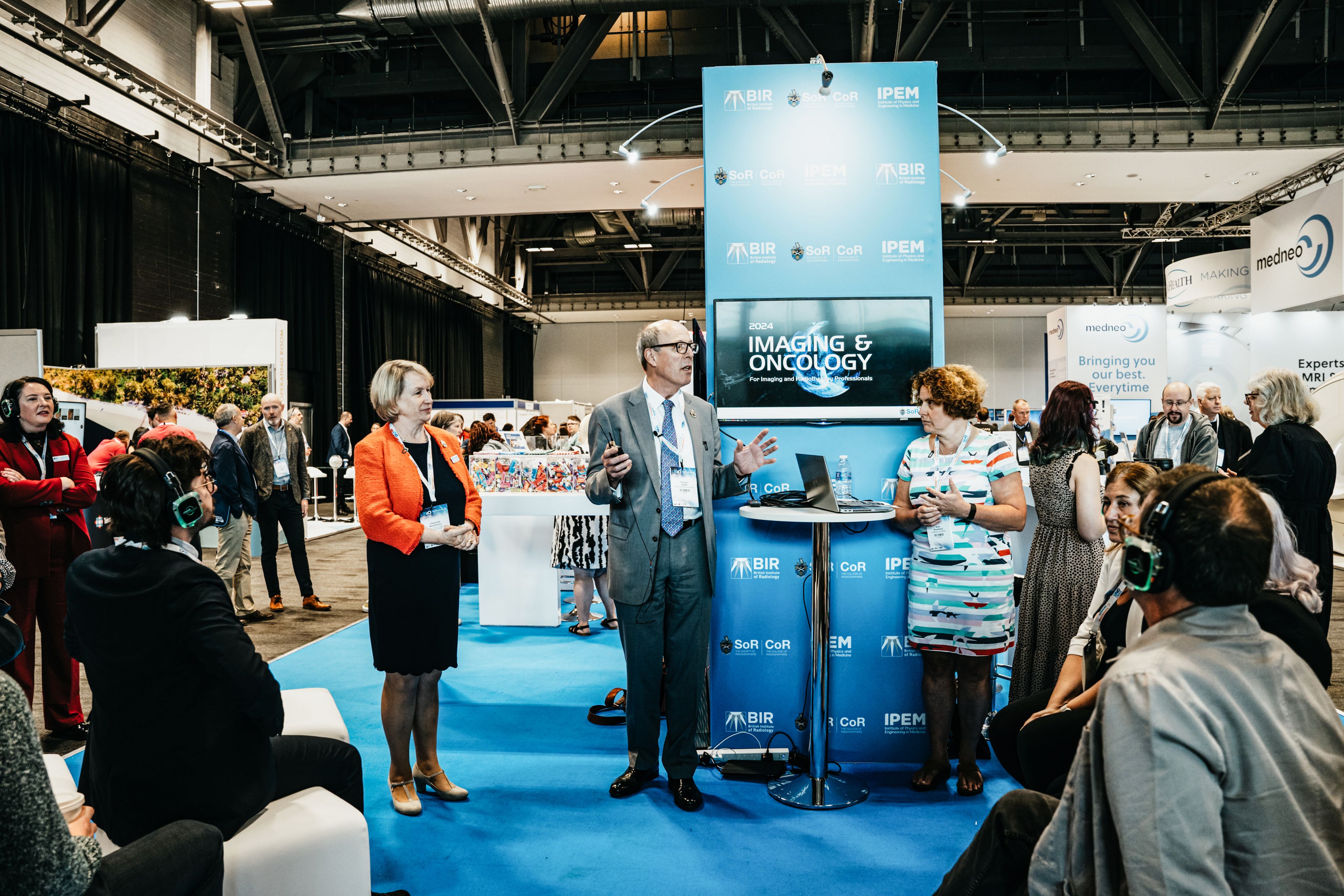
The launch of Imaging & Oncology 2024 on the SoR stand
The launch of Imaging & Oncology 2024 on the SoR stand
The SoR stand in the technical exhibition was the venue of the launch of Imaging & Oncology 2024. The publication's remit is summed up in the introduction to the first issue: “The authors were invited to write not because they have the power to peer into a crystal ball and divine our futures, but because they have the abilities to lead and anticipate. The 'blue sky' speculation in the following pages will make you think. Some will infuriate. You will find yourself nodding in agreement and shaking your head in disbelief, maybe both at the same time.” Special thanks go to Professor Ruth Strudwick, who is stepping down as editor after six years. Under Ruth’s excellent stewardship, the publication has flourished and continually improved.
The SoR stand in the technical exhibition was the venue of the launch of Imaging & Oncology 2024. The publication's remit is summed up in the introduction to the first issue: "The authors were invited to write not because they have the power to peer into a crystal ball and divine our futures, but because they have the abilities to lead and anticipate. The 'blue sky' speculation in the following pages will make you think. Some will infuriate. You will find yourself nodding in agreement and shaking your head in disbelief, maybe both at the same time." Special thanks go to Professor Ruth Strudwick, who is stepping down as editor after six years. Under Ruth’s excellent stewardship, the publication has flourished and continually improved.
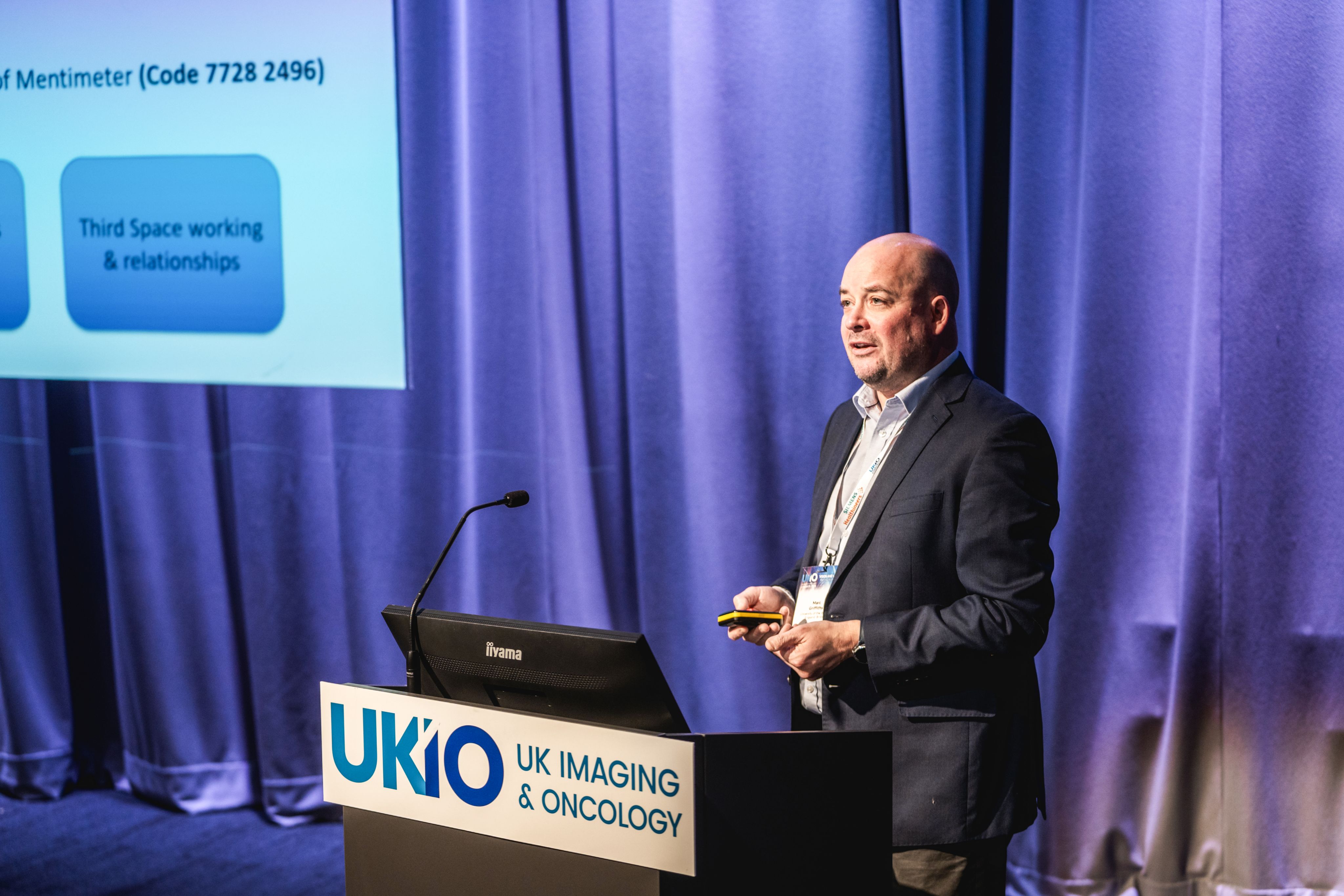
Professor Marc Griffiths delivering the Stanley Melville Memorial Lecture
Professor Marc Griffiths delivering the Stanley Melville Memorial Lecture
The late Dr Stanley Melville, former president of the Society of Radiographers, was honoured through a memorial lecture, this year delivered by Professor Marc Griffiths. Marc trained as a Diagnostic Radiographer and is currently pro-vice chancellor and head of the College of Health, Science and Society at the University of the West of England. He has been an Approval and Accreditation Board member and an assessor for the College of Radiographers for many years. In his lecture, titled ‘Footsteps for our future – societal impact’, Marc delved into his career journey, highlighting the interplay between various levels of education and social mobility. He emphasised the significant advantages of multiprofessional collaboration and discussed the technological advancements that have enhanced patient care.
The late Dr Stanley Melville, former president of the Society of Radiographers, was honoured through a memorial lecture, this year delivered by Professor Marc Griffiths. Marc trained as a Diagnostic Radiographer and is currently pro-vice chancellor and head of the College of Health, Science and Society at the University of the West of England. He has been an Approval and Accreditation Board member and an assessor for the College of Radiographers for many years. In his lecture, titled ‘Footsteps for our future – societal impact’, Marc delved into his career journey, highlighting the interplay between various levels of education and social mobility. He emphasised the significant advantages of multiprofessional collaboration and discussed the technological advancements that have enhanced patient care.
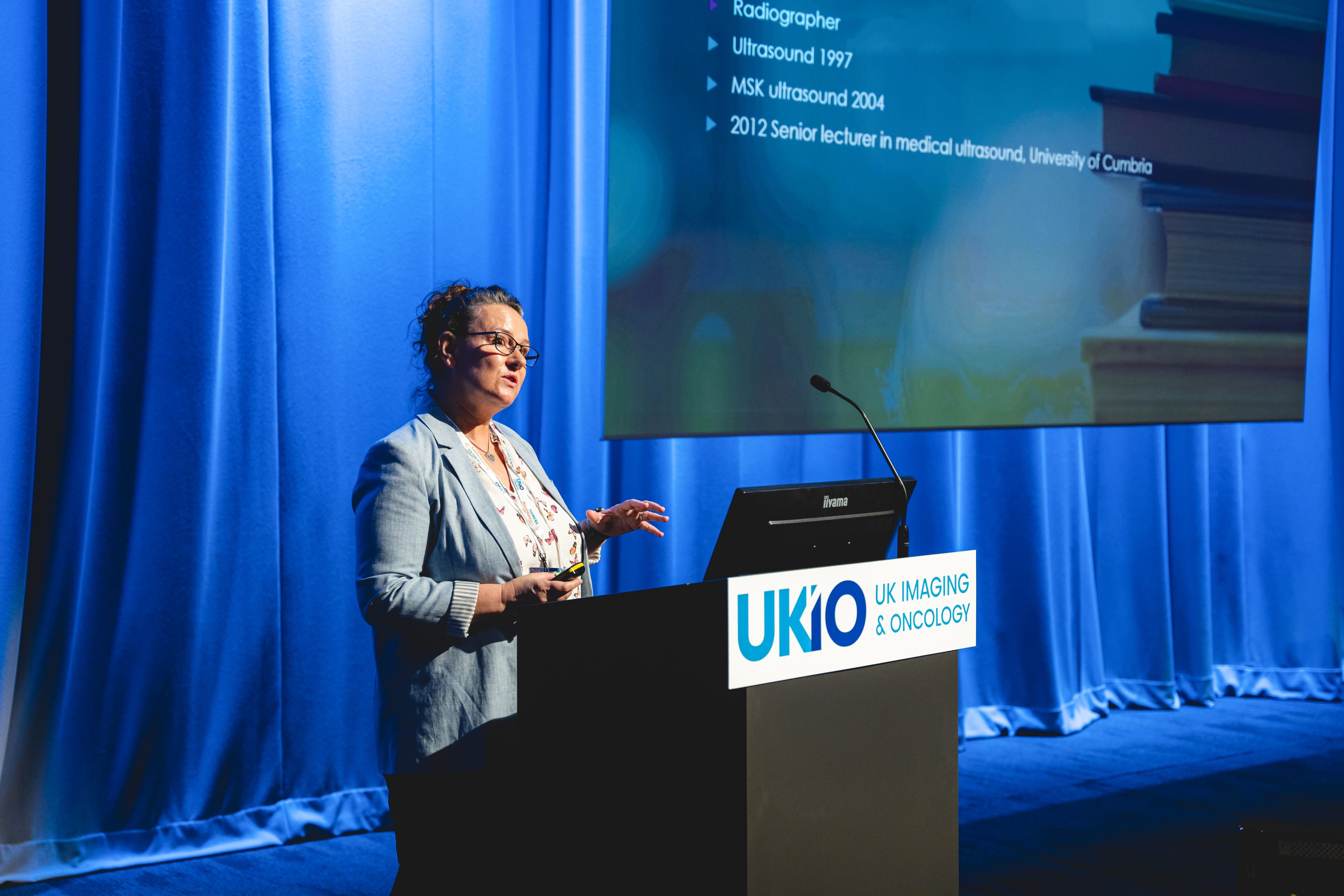
Lorelei Waring was the guest speaker during this year’s William Stripp Memorial Lecture
Lorelei Waring was the guest speaker during this year’s William Stripp Memorial Lecture
Lorelei Waring, advanced practitioner in ultrasound and now a senior lecturer at the University of Cumbria, delivered the William Stripp Memorial Lecture. The criteria for this lecture are that it covers an orthopaedic topic, includes a strong practical component and is delivered by a radiographer. In her insightful lecture, ‘Musculoskeletal ultrasound education – meeting demands’, Lorelei explored the challenges, opportunities and existential threats facing MSK ultrasound education.
The College of Radiographers’ Martine Jackson Memorial Lecture honours the life and work of Martine Jackson, who had a distinguished career encompassing all aspects of radiotherapy practice. She significantly influenced both national and international discussions on the future of the radiotherapy profession and services.
Martine was dedicated to prioritising the patient experience in radiography. The memorial lecture, given by invitation, is presented by individuals who have made exceptional contributions to advancing radiotherapy, particularly in the realm of patient care. Dr Simon Goldsworthy, consultant radiographer in breast cancer at Somerset NHS Foundation Trust, presented the evolution of his PhD research and its implications for enhancing patient comfort during radiotherapy, both now and in the future. His lecture, titled ‘Set up errors to patient comfort in radiotherapy – a journey of discovery’, detailed these advancements.
Lorelei Waring, advanced practitioner in ultrasound and now a senior lecturer at the University of Cumbria, delivered the William Stripp Memorial Lecture. The criteria for this lecture are that it covers an orthopaedic topic, includes a strong practical component and is delivered by a radiographer. In her insightful lecture, ‘Musculoskeletal ultrasound education – meeting demands’, Lorelei explored the challenges, opportunities and existential threats facing MSK ultrasound education.
The College of Radiographers’ Martine Jackson Memorial Lecture honours the life and work of Martine Jackson, who had a distinguished career encompassing all aspects of radiotherapy practice. She significantly influenced both national and international discussions on the future of the radiotherapy profession and services.
Martine was dedicated to prioritising the patient experience in radiography. The memorial lecture, given by invitation, is presented by individuals who have made exceptional contributions to advancing radiotherapy, particularly in the realm of patient care. Dr Simon Goldsworthy, consultant radiographer in breast cancer at Somerset NHS Foundation Trust, presented the evolution of his PhD research and its implications for enhancing patient comfort during radiotherapy, both now and in the future. His lecture, titled ‘Set up errors to patient comfort in radiotherapy – a journey of discovery’, detailed these advancements.
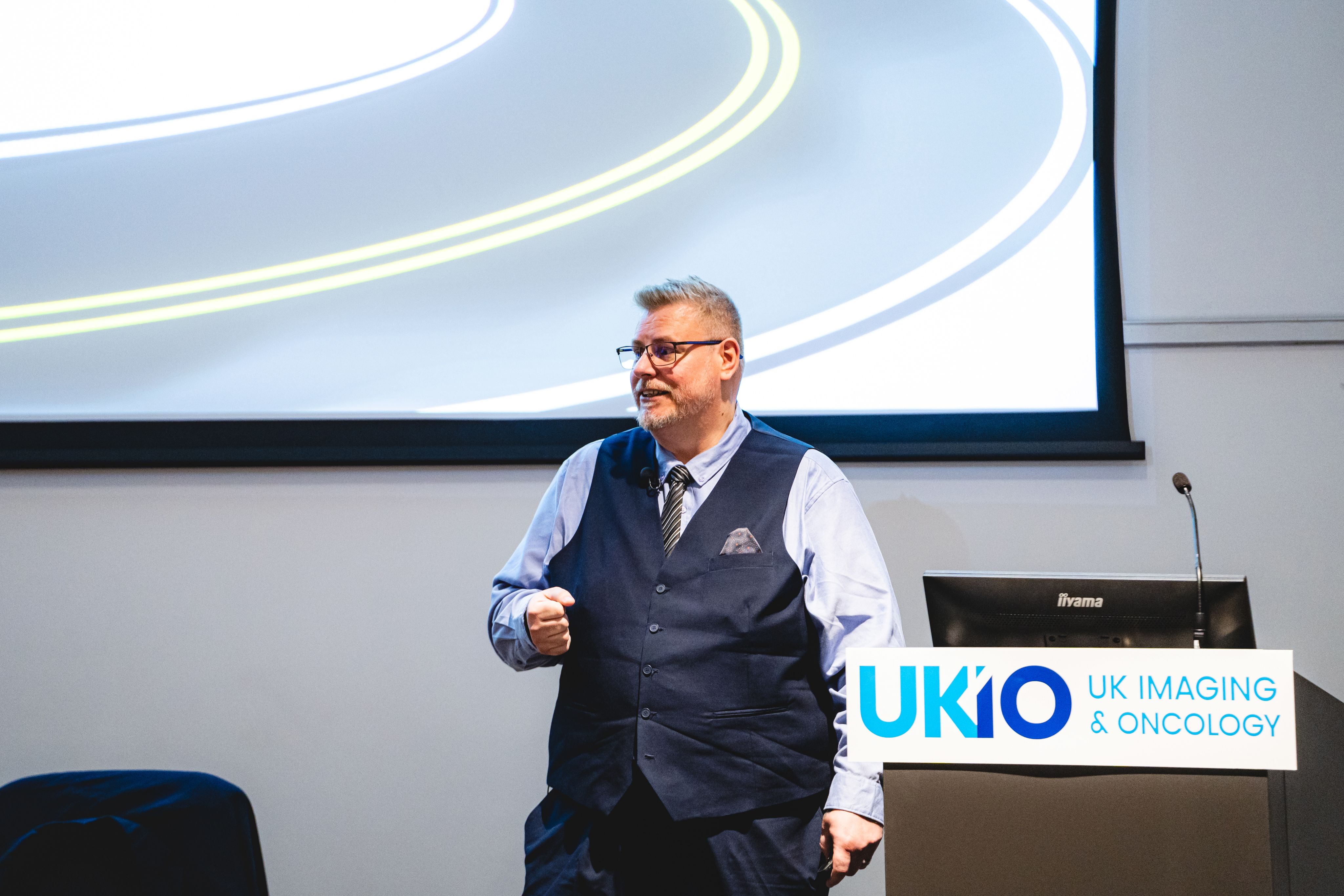
The Patient Voice session was presented this year by Dan Fleshbourne, who shared his experience as a carer
The Patient Voice session was presented this year by Dan Fleshbourne, who shared his experience as a carer
On the final day of the congress, I had the pleasure of chairing the Patient Voice session. This year, Dan Fleshbourne, senior occupational therapy assistant and carer lead at the Recovery College, as well as staff governor for the adult community at Lincolnshire Partnership NHS Foundation Trust, delivered a compelling account of his experience as a carer from a young age. Following his presentation, an interactive workshop delved deeper into the carer role.
During my three days at UKIO, I also attended numerous presentations and reviewed the e-posters in my role at the college. I hope this brief overview encourages you to attend UKIO again or for the first time in 2025. I assure you it will be a decision you won't regret.
I would like to extend a special thank you to our College of Radiographers Industry Partnership Scheme partners, who provide invaluable support for research in our profession. Find out more about the scheme and the partners here.
On the final day of the congress, I had the pleasure of chairing the Patient Voice session. This year, Dan Fleshbourne, senior occupational therapy assistant and carer lead at the Recovery College, as well as staff governor for the adult community at Lincolnshire Partnership NHS Foundation Trust, delivered a compelling account of his experience as a carer from a young age. Following his presentation, an interactive workshop delved deeper into the carer role.
During my three days at UKIO, I also attended numerous presentations and reviewed the e-posters in my role at the college. I hope this brief overview encourages you to attend UKIO again or for the first time in 2025. I assure you it will be a decision you won't regret.
I would like to extend a special thank you to our College of Radiographers Industry Partnership Scheme partners, who provide invaluable support for research in our profession. Find out more about the scheme and the partners here.
More about the College of Radiographers
The College of Radiographers, a subsidiary of the Society of Radiographers, is a registered charity concerned with standards in the provision and development of diagnostic imaging and radiotherapy for the public benefit.
Find out more about the work of the college here
Read more






